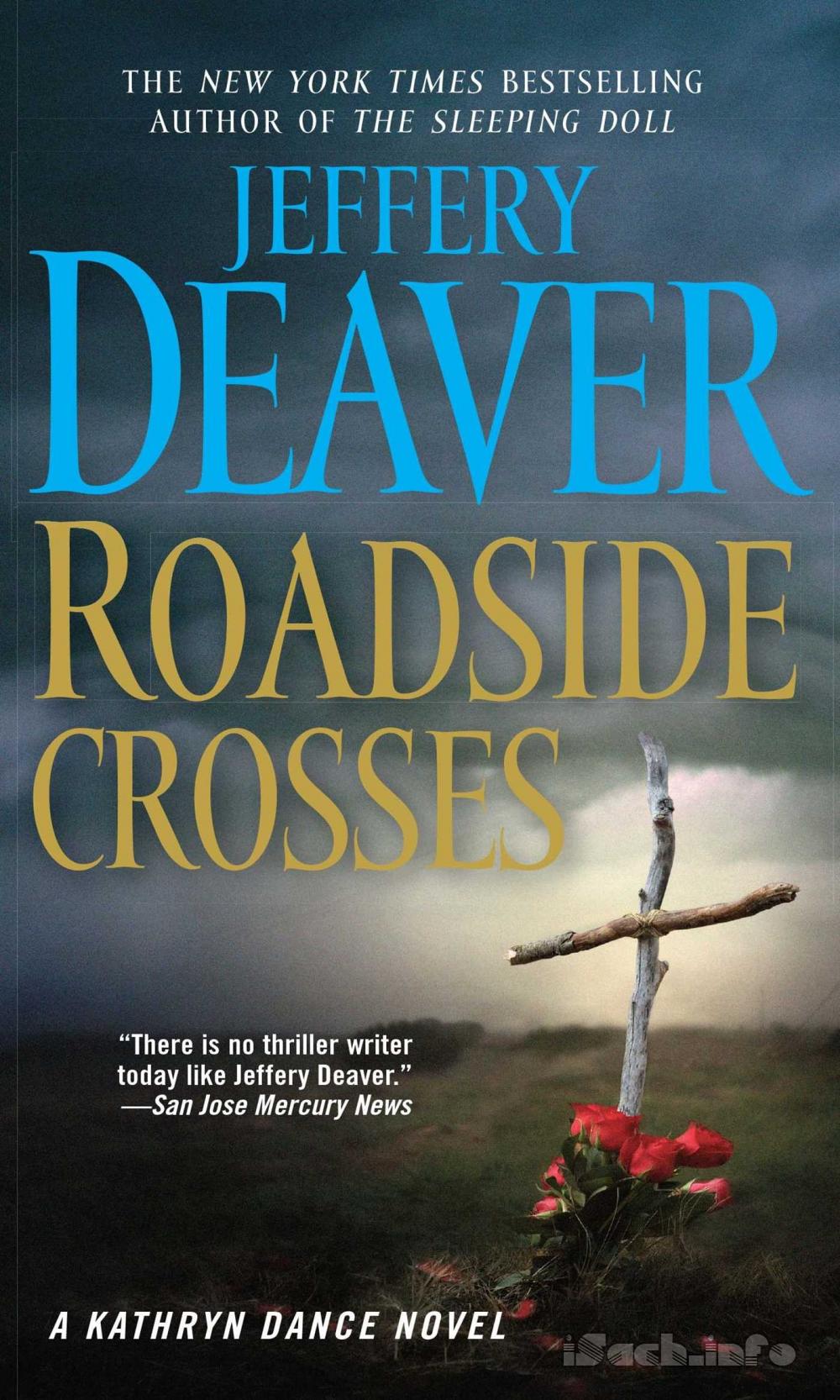Chapter 4
“O
H, THAT’S SAD,” the woman said.Her husband, behind the wheel of their Ford SUV, which he’d just paid $70 to fill, glanced at her. He was in a bad mood. Because of the gas prices and because he’d just had a tantalizing view of Pebble Beach golf course, which he couldn’t afford to play even if the wife would let him.
One thing he definitely didn’t want to hear was something sad.
Still, he’d been married for twenty years, and so he asked her, “What?” Maybe a little more pointedly than he intended.
She didn’t notice, or pay attention to, his tone. “There.”
He looked ahead, but she was just gazing out of the windshield at this stretch of deserted highway, winding through the woods. She wasn’t pointing at anything in particular. That made him even more irritated.
“Wonder what happened.”
He was about to snap, “To what?” when he saw what she was talking about.
And he felt instantly guilty.
Stuck in the sand ahead of them, about thirty yards away, was one of those memorials at the site of a car accident. It was a cross, kind of a crude thing, sitting atop some flowers. Dark red roses.
“Is sad,” he echoed, thinking of their children—two teenagers who still scared the hell out of him every time they got behind the wheel. Knowing how he’d feel if anything happened to them in an accident. He regretted his initial snippiness.
He shook his head, glancing at his wife’s troubled face. They drove past the homemade cross. She whispered. “My God. It just happened.”
“It did?”
“Yep. It’s got today’s date on it.”
He shivered and they drove on toward a nearby beach that somebody had recommended for its walking trails. He mused, “Something odd.”
“What’s that, dear?”
“The speed limit’s thirty-five along here. You wouldn’t think somebody’d wipe out so bad that they’d die.”
His wife shrugged. “Kids, probably. Drinking and driving.”
The cross sure put everything in perspective. Come on, buddy, you could be sitting back in Portland crunching numbers and wondering what kind of insanity Leo will come up with at the next team rally meeting. Here you are in the most beautiful part of the state of California, with five days of vacation left.
And you couldn’t come close to par at Pebble Beach in a million years. Quit your moaning, he told himself.
He put his hand on his wife’s knee and drove on toward the beach, not even minding that fog had suddenly turned the morning gray.
DRIVING ALONG 68, Holman Highway, Kathryn Dance called her children, whom her father, Stuart, was driving to their respective day camps. With the early-morning meeting at the hotel, Dance had arranged for Wes and Maggie—twelve and ten—to spend the night with their grandparents.
“Hey, Mom!” Maggie said. “Can we go to Rosie’s for dinner tonight?”
“We’ll have to see. I’ve got a big case.”
“We made noodles for the spaghetti for dinner last night, Grandma and me. And we used flour and eggs and water. Grandpa said we were making them from scratch. What does ‘from scratch’ mean?”
“From all the ingredients. You don’t buy them in a box.”
“Like, I know that. I mean, what does ‘scratch’ mean?”
“Don’t say ‘like.’ And I don’t know. We’ll look it up.”
“Okay.”
“I’ll see you soon, sweetie. Love you. Put your brother on.”
“Hey, Mom.” Wes launched into a monologue about the tennis match planned for today.
Wes was, Dance suspected, just starting the downhill coast into adolescence. Sometimes he was her little boy, sometimes a distant teenager. His father had died two years ago, and only now was the boy sliding out from under the weight of that sorrow. Maggie, though younger, was more resilient.
“Is Michael still going out on his boat this weekend?”
“I’m sure he is.”
“That rocks!” O’Neil had invited the boy to go fishing this Saturday, along with Michael’s young son, Tyler. His wife, Anne, rarely went out on the boat and, though Dance did from time to time, seasickness made her a reluctant sailor.
She then spoke briefly to her father, thanking him for baby-sitting the children, and mentioned that the new case would be taking up a fair amount of time. Stuart Dance was the perfect grandfather—the semiretired marine biologist could make his own hours and truly loved spending time with the children. Nor did he mind playing chauffeur. He did, however, have a meeting today at the Monterey Bay aquarium but assured his daughter that he’d drop the children off with their grandmother after camp. Dance would pick them up from her later.
Every day Dance thanked fate or the gods that she had loving family nearby. Her heart went out to single mothers with little support.
She slowed, turned at the light and pulled into the parking lot of Monterey Bay Hospital, studying a crowd of people behind a row of blue saw-horse barriers.
More protesters than yesterday.
And yesterday had seen more than the day before.
MBH was a famed institution, one of the best medical centers in the region, and one of the most idyllic, set in a pine forest. Dance knew the place well. She’d given birth to her children here, sat with her father as he recovered from major surgery. She’d identified her husband’s body in the hospital’s morgue.
And she herself had recently been attacked here—an incident related to the protest Dance was now watching.
As part of the Daniel Pell case, Dance had sent a young Monterey County deputy to guard the prisoner in the county courthouse in Salinas. The convict had escaped and, in the process, had attacked and severely burned the deputy, Juan Millar, who’d been brought here to intensive care. That had been such a hard time—for his confused, sorrowful family, for Michael O’Neil, and for his fellow officers at the MCSO. For Dance too.
It was while she was visiting Juan that his distraught brother, Julio, had assaulted her, enraged that she was trying to take a statement from his semi-conscious sibling. Dance had been more startled than hurt by the attack and had chosen not to pursue a case against the hysterical brother.
A few days after Juan was admitted, he’d died. At first, it seemed that the death was a result of the extensive burns. But then it was discovered that somebody had taken his life—a mercy killing.
Dance was saddened by the death, but Juan’s injuries were so severe that his future would have been nothing but pain and medical procedures. Juan’s condition had also troubled Dance’s mother, Edie, a nurse at the hospital. Dance recalled standing in her kitchen, her mother nearby, gazing into the distance. Something was troubling her deeply, and she soon told Dance what: She’d been checking on Juan when the man had swum to consciousness and looked at her with imploring eyes.
He’d whispered, “Kill me.”
Presumably he’d delivered this plea to anybody who’d come to visit or tend to him.
Soon after that, someone had fulfilled his wish.
No one knew the identity of the person who had combined the drugs in the IV drip to end Juan’s life. The death was now officially a criminal investigation—being handled by the Monterey County Sheriff’s Office. But it wasn’t being investigated very hard; doctors reported that it would have been highly unlikely for the deputy to live for more than a month or two. The death was clearly a humane act, even if criminal.
But the case had become a cause célèbre for pro-lifers. The protesters that Dance was now watching in the parking lot held posters emblazoned with crosses and pictures of Jesus and of Terry Schiavo, the comatose woman in Florida, whose right-to-die case the U.S. Congress itself became entwined in.
The placards being waved about in front of Monterey Bay Hospital decried the horrors of euthanasia and, apparently because everyone was already assembled and in a protesting mood, abortion. They were mostly members of Life First, based in Phoenix. They’d arrived within days of the young officer’s death.
Dance wondered if any of them caught on to the irony of protesting death outside a hospital. Probably not. They didn’t seem like folks with a sense of humor.
Dance greeted the head of security, a tall African-American, standing outside the main entrance. “Morning, Henry. They keep coming, it looks like.”
“Morning, Agent Dance.” A former cop, Henry Bascomb liked using departmental titles. He gave a smirk, nodding their way. “Like rabbits.”
“Who’s the ringleader?” In the center of the crowd was a scrawny balding man with wattles beneath his pointy chin. He was in clerical garb.
“That’s the head, the minister,” Bascomb told her. “Reverend R. Samuel Fisk. He’s pretty famous. Came all the way from Arizona.”
“R. Samuel Fisk. Very ministerial-sounding name,” she commented.
Beside the reverend stood a burly man with curly red hair and a buttoned dark suit. A bodyguard, Dance guessed.
“Life is sacred!” somebody called, aiming the comment to one of the news trucks nearby.
“Sacred!” the crowd took up.
“Killers,” Fisk shouted, his voice surprisingly resonant for such a scarecrow.
Though it wasn’t directed at her, Dance felt a chill and flashed back to the incident in the ICU, when enraged Julio Millar had grabbed her from behind as Michael O’Neil and another companion intervened.
“Killers!”
The protesters took up the chant. “Kill-ers. Kill-ers!” Dance guessed they’d be hoarse later in the day.
“Good luck,” she told the security chief, who rolled his eyes uncertainly.
Inside, Dance glanced around, half expecting to see her mother. Then she got directions from reception and hurried down a corridor to the room where she’d find the witness in the Roadside Cross Case.
When she stepped into the open doorway, the blond teenage girl inside, lying in the elaborate hospital bed, looked up.
“Hi, Tammy. I’m Kathryn Dance.” Smiling at the girl. “You mind if I come in?”



 ePub
ePub A4
A4